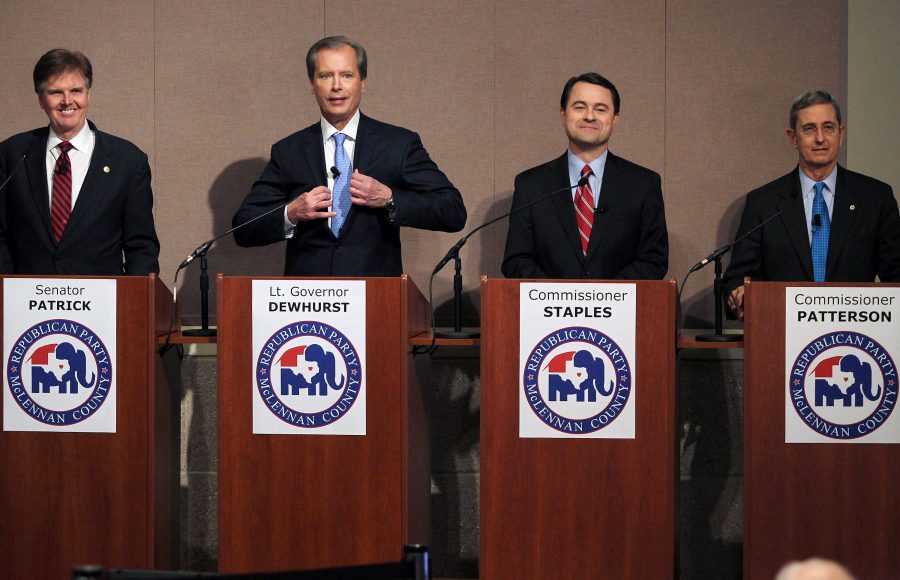There are four Republican candidates for lieutenant governor this year: incumbent David Dewhurst, Agriculture Commissioner Todd Staples, Land Commissioner Jerry Patterson and state Sen. Dan Patrick. With all four vying to win the Republican primary — a contest determined by the just over 10 percent of voters, many of them passionate conservatives — the candidates have unsurprisingly been taking political positions further and further to the right.
Most of the lieutenant governor’s powers involve the position’s role as the president of the Texas Senate. The lieutenant governor presides over the chamber, names the chairmen of the ever-powerful committees and helps to craft the rules at the beginning of each session. Accordingly, many of the far-right ideas propagated by these candidates will involve changing the way the Senate works and runs. And in Texas, where the state Senate features a Democratic Party that is in the minority and desperate to use every dilatory maneuver at its disposal, this could mean big changes to the rules in the legislative process that currently benefit the minority.
According to the lieutenant governor hopefuls, the most odious abuse of power from Democrats in the Senate stems from the use of the dreaded two-thirds rule. The idea is actually quite simple: A supermajority of the Senate — 21 of the 31 senators — must agree on a bill before it is brought to the floor. The rule, which originated when Democrats held all 31 seats in the Senate, is designed to protect minority interests and viewpoints in the deliberative body. Despite the fact that Dewhurst was strongly in favor of this parliamentary hurdle earlier in his lieutenant governorship, the policy’s fate now looks much more uncertain, no matter which Republican candidate takes the reins. But to remove it would eliminate some sacred safeguards in our system of checks and balances, which protect both geographical and political minority interests.
Of course, if you ask any of the Republicans running for lieutenant governor, they will not admit that they want to vanquish this protection of minority interests. Patrick, in a push that has been affirmed by the other candidates, said he believes 60 percent should be the new threshold. The percentage conveniently works out to 19 senators, the exact number of members in the Senate Republican caucus. In other words, make no mistake: Lowering the threshold by even those two votes would have the capacity to completely eliminate any semblance of power or relevance that the Senate Democratic caucus may currently have.
Despite these concerns, the big pushback against the two-thirds rule fails to take into consideration the myriad other functions of the policy besides blocking controversial red vs. blue bills. Historically, the rule was designed to protect rural interests against those of urban concerns. So with approximately 19 senators hailing from the cities and suburbs today, changing the two-thirds rule may disadvantage not only Democrats, but also rural areas.
“Democrats and urban Republicans will team up,” said state Sen. John Whitmire, D-Houston, and dean of the upper chamber. “Mark my words, we will run this state together.”
This view has been reaffirmed by other Democratic state senators, who appear rather confident that a change in the rules would foster positive benefits for them in addition to the obvious drawbacks. Simply put, while the more controversial social issues come up every once in a while, the vast majority of the Legislature’s business is mundane, day-to-day financial measures that split legislators more geographically than politically. Especially when it comes to important monetary choices on water and transportation, an urban coalition would have the capacity to steamroll over the rural minority.
When I mentioned this to Dewhurst, he simply said, “I don’t want to see anyone get steamrolled,” but avoided being specific as to how that would be avoided. Dewhurst, of course, is a Houstonian, as are Patterson and Patrick. Dewhurst was adamant that this possible harm to rural areas or other minority interests would all be worth it because the Democrats are unreasonably stubborn in their demands, “not even coming to the table.”
Whitmire would definitely disagree with this assessment. He spoke of Democrats and Republicans coming together to reform gun laws, appeasing conservative demands while still placating liberal concerns. Specifically pertaining to UT students, in the compromise he claims credit for, students may now bring their handguns to campus in their locked cars, while a more ambitious proposal to allow concealed carry on campus was tabled.
“The system worked,” Whitmire said. “And Republicans were content with what we accomplished, so ‘campus carry’ was not resurrected in a special session.”
The two-thirds rule is an important tradition with honorable motives in our state Senate. It protects both political and geographical minorities, and it encourages collaboration and bipartisanship. The rule should not be eliminated or diminished, no matter the desires of the current Republican leadership.
Horwitz is a government junior from Houston. Follow Horwitz on Twitter @NmHorwitz.





















